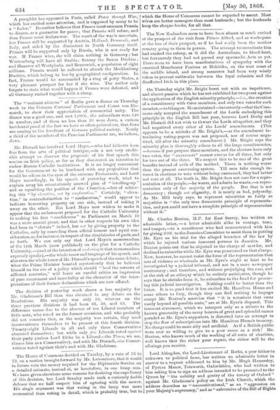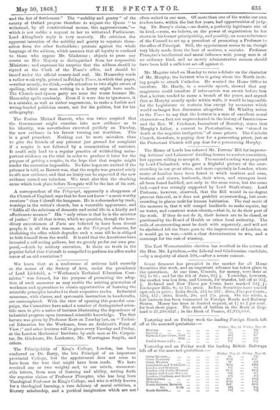Lord Abingdon, the Lord-Lieutenant of Berks, a peer hither to
unknown to political fame, has written an admirable letter in answer to a request addressed to him by Mr. Hugh lalamersley, of Pyrton Manor, Tetaworth, Oxfordshire, who had written to him asking hint to sign an address intended to be presented to the Queen by "the nobility and gentry of the county of Oxford" against Mr. Gladstone's policy on the Irish Church, which the address describes as "unconstitutional," as an "aggression on your Majesty's supremacy," and as" subversive of the Bill of Rights and the Act of Settlement." The "nobility and gentry" of the county of Oxford propose therefore to request the Queen "to withstand, by all constitutional means, this aggressiveness,"— which is not unlike a request to her to withstand Parliament. Lord Abingdon's reply is very masterly. He criticizes the apparent intention of the nobility and gentry to separate them- selves from the other freeholders ; protests against the whole language of the address, which assumes that all loyalty is confined to those who oppose Mr. Gladstone ; objects to press any -course on Her Majesty as distinguished from her responsible Ministers ; and expresses his surprise that the address should be signed at the Clerk of the Peace's office, and should be issued under the official county-hall seal. Mr. Hamersley sends a rather weak reply, printed in Friday's Times, in which that paper, —rather meanly, we thiuk,—calls attention to two slight errors of spelling, which any man writing in a hurry might have made. The Church-and-Queen party are none the worse because Mr. Hatnersley spells carelessly. Even if it were due to ignorance, it is a mistake, as well as rather ungenerous, to make a foolish and wrong-headed politician smart, not for his politics, but for his orthography.































 Previous page
Previous page